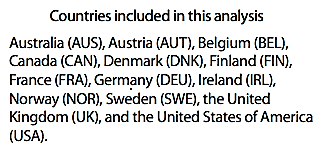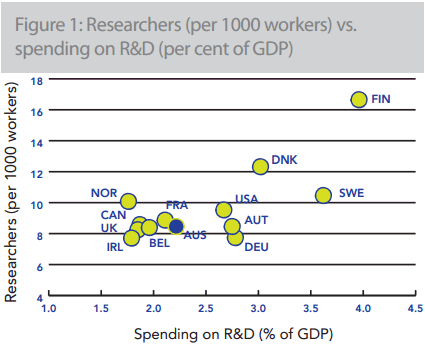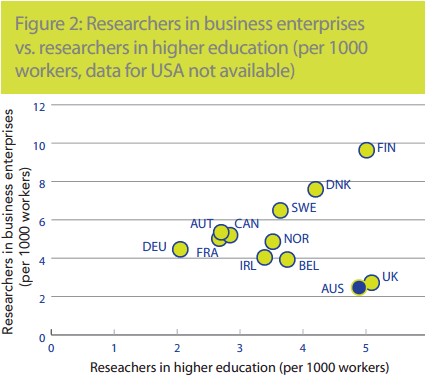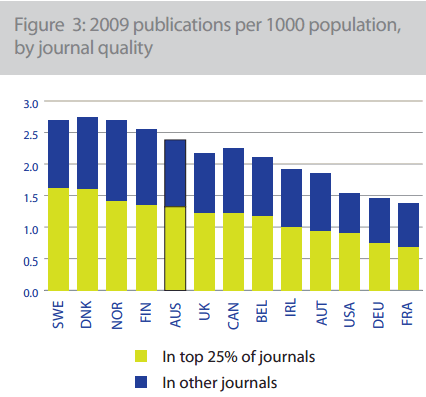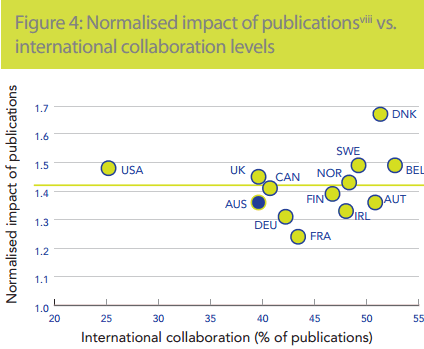|
News & Views item - May 2012 |
![]() Chief Scientist Speaks to the Cooperative Research Centres Association's 2012
Conference on Developing Future Research Priorities. (May 19, 2012)
Chief Scientist Speaks to the Cooperative Research Centres Association's 2012
Conference on Developing Future Research Priorities. (May 19, 2012)
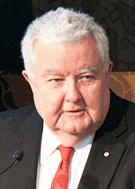 This
past Thursday Australia's Chief Scientist, the immediate past vice-chancellor of
the Australian National University, Ian Chubb, told the 2012 conference of the
Cooperative Research Centres Association (CRCA) that the short answer as to what
Australia "wants, is a healthy and safe, socially, culturally and
economically prosperous nation". And he went on to say: "The long answer
involves finding out what we need to forge a path to get there."
This
past Thursday Australia's Chief Scientist, the immediate past vice-chancellor of
the Australian National University, Ian Chubb, told the 2012 conference of the
Cooperative Research Centres Association (CRCA) that the short answer as to what
Australia "wants, is a healthy and safe, socially, culturally and
economically prosperous nation". And he went on to say: "The long answer
involves finding out what we need to forge a path to get there."
Professor Chubb then became cagey saying he didn't want to give too much of his answer away as to what are the nation needs because "I will be addressing the National Press Club to launch my Office’s Health of Australian Science report, which examines in detail our successes and vulnerabilities in order to determine where our priorities should lie". However, he promised his audience that the report examines where the present "trajectory" of Australian science "is heading us... from our high schools, to our universities, to industry, to international comparisons, it offers a comprehensive overview of where we stand".
As in his previous public utterances, the Chief Scientist tends to paint with a broad brush, perhaps he feels that by going into detail he would be straying into the realm of policy. Nevertheless, we are told that "Australia needs the ability to be able to set research priorities" and then notes that while "60% of government R&D goes to our universities, [t]he majority of that funding is heavily influenced by what the students choose to study, particularly the choices of undergraduates," and, therefore, "as a whole, more, probably much more, than 50% of all government spending on research is seriously influenced by the choices of our 17 and 18 year olds, usually under the advice of 'choose something you find interesting'".
So Professor Chubb concludes that in fact research funding is currently heavily influenced through a "popularity contest" driven by high school leavers entering university, and he does not believe this is the best way "to ensure Australia is conducting research, and preparing a skill base that will prepare us for the challenges of the future".
Perhaps in part to overcome this deficiency, this past February the government established the Australian Research Committee, which is chaired by the Chief Scientist and which according to Professor Chubb is "to provide advice on emerging problems and opportunities for research investment. The primary focus for this year is "the development of a National Research Investment Plan. This plan will provide a strategic framework to help government make decisions about how much funding should be given in certain areas, how to balance research investment, between basic and applied research, and between universities, industry and government agencies."
Professor Chubb then introduces a cautionary note: "[E]ven if we can change the funding structure so that the money no longer follows the students so tightly, it does not address the additional challenge that will affect our workforce if/when we do not have enough experts in the areas we need. There are disciplines where we are already facing workplace and research shortages, and those where the shortages are expected to get worse – areas like engineering, mathematics, physics, chemistry, agriculture and statistics."
But what gets no mention by the Chief Scientist is the problem of increasing not only the amount but also the proportion of government research funds that should be directed from block granting and toward direct funding of principle investigators by the Australian Research and the National Health and Medical Research Councils together with a concerted push toward improving and enhancing their peer review systems.
Furthermore, the matter of how to entice the nation's youngsters to have both a greater regard for and interest in science and mathematics is skated over. It is all very well for Professor Chubb to ask the CRCA rhetorically: "How can we expect students to take up science subjects and degrees when they cannot see the relevance to their lives?" And then adds, "I have already assembled a brains trust to tackle this very issue in my office and you can expect to hear more about it later in the year," but this is a matter that needs to be dealt with from K through 12 and beyond in order to develop the body of teachers to inspire, and the infrastructure to equip them.
If all that stems from Professor Chubb's "brains trust" is yet another door-stopping-sized report rather than long-ranged concrete proposals that will gain bipartisan support, the matter will continue to meander from one billabong of recommendations to the next sinkhole of disregard.
____________________________________
Alan G. Pettigrew is Adjunct Professor, College of Medicine, Biology and
Environment, at The Australian National University, and Professorial Fellow, at
The University of Melbourne. He has produced
the second of the Office of the Chief Scientist's Occasional Papers![]() . This one addresses: "How well does Australia’s science research and innovation
system perform compared to other developed nations? Do we spend more or less on
research and development than countries in Europe, Scandinavia and North
America? The paper highlights some key results for Australia and other developed
nations from the OECD Science, Technology and Industry Scoreboard 2011."
. This one addresses: "How well does Australia’s science research and innovation
system perform compared to other developed nations? Do we spend more or less on
research and development than countries in Europe, Scandinavia and North
America? The paper highlights some key results for Australia and other developed
nations from the OECD Science, Technology and Industry Scoreboard 2011."
Here we reproduce the figures from Professor Pettigrew's paper:
